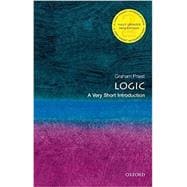
Logic: A Very Short Introduction
by Priest, GrahamBuy New
Rent Book
Rent Digital
Downloadable: 180 Days
Downloadable: 365 Days
Downloadable: Lifetime Access
Used Book
We're Sorry
Sold Out
This item is being sold by an Individual Seller and will not ship from the Online Bookstore's warehouse. The Seller must confirm the order within two business days. If the Seller refuses to sell or fails to confirm within this time frame, then the order is cancelled.
Please be sure to read the Description offered by the Seller.
Summary
In this new edition Graham Priest expands his discussion to cover the subjects of algorithms and axioms, and proofs in mathematics.
ABOUT THE SERIES: The Very Short Introductions series from Oxford University Press contains hundreds of titles in almost every subject area. These pocket-sized books are the perfect way to get ahead in a new subject quickly. Our expert authors combine facts, analysis, perspective, new ideas, and enthusiasm to make interesting and challenging topics highly readable.
Author Biography
Graham Priest, Distinguished Professor of Philosophy at the CUNY Graduate Center
Graham Priest is Distinguished Professor of Philosophy at the CUNY Graduate Center, as well as a regular visitor at the University of Melbourne (where he was Boyce Gibson Professor of Philosophy), and at St. Andrews University. His books include Doubt Truth to be a Liar (OUP, 2008), One (OUP, 2014), and Towards Non-Being (2nd ed. OUP, 2016),
Table of Contents
Preface to Second Edition
Preface to First Edition
1. Validity: what follows from what?
2. Truth funtions - or not?
3. Names and quantifiers: is nothing something?
4. Descriptions and existence: did the Greeks worship Zeus?
5. Self-reference: What is this chapter about?
6. Necessity and possibility: what will be must be?
7. Conditionals: what's in an if?
8. The future and the past: is time real?
9. Identity and change: is anything ever the same?
10. Vagueness: how do you stop sliding down a slippery slope?
11. Probability: the strange case of the missing reference class
12. Inverse probability: you can't be indifferent about it!
13. Decision theory: great expectations
14. Halt! What goes there?
15. Maybe it is true - but you can't prove it!
A little history and some further reading
Glossary
Problems
Problem solutions
Bibliography
General index
An electronic version of this book is available through VitalSource.
This book is viewable on PC, Mac, iPhone, iPad, iPod Touch, and most smartphones.
By purchasing, you will be able to view this book online, as well as download it, for the chosen number of days.
A downloadable version of this book is available through the eCampus Reader or compatible Adobe readers.
Applications are available on iOS, Android, PC, Mac, and Windows Mobile platforms.
Please view the compatibility matrix prior to purchase.
